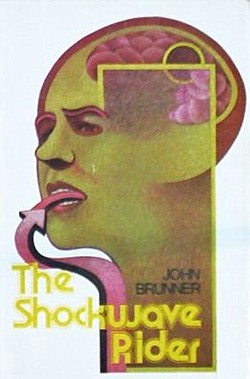The Shockwave Rider
Spoiler: Reference of cyberpunk of which it is the ancestor, The Shockwave Rider plunges you into a future 2010 which looks like the real one and raises the question of omnipresent surveillance in an information society.
Présentation

Nickie Haflinger had lived a score of lifetimes . . . but technically he didn’t exist. He was a fugitive from Tarnover, the high-powered government think tank that had educated him. First he had broken his identity code—then he escaped.
Now he had to find a way to restore sanity and personal freedom to the computerized masses and to save a world tottering on the brink of disaster. He didn’t care how he did it—but the government did. That’s when his Tarnover teachers got him back in their labs . . . and Nickie Haflinger was set up for a whole new education.
By John Brunner, in 1975, ISBN 2-221-01709-4 and many times since.
Arsouyes’ opinion
⭐️ Reference
This book is the ancestor of cyberpunk; it contains all the elements that will then be systematically included in this genre: the near future, a technological society and what differentiates cyberpunk from other similar genres (anticipations and dystopias), hacking and the power of multinationals.
😃 aryliin
After a difficult start, where you have to get used to the author’s style and the terms used, you let yourself be caught up in the story and want to know how it ends.
It is difficult to come to terms with the terms used by the author, because in 1975, the date of its publication, computing and networking as we know them today were only in their infancy. The author therefore invents terms to describe elements of his universe. What he calls snakes could be translated as worms, what he calls veephones, by smartphone or laptop …
The hero is very intelligent and extremely computer savvy. It’s interesting how he gets out of pretty much any situation with that, not luck or divine intervention.
Some topics, such as over-surveillance of people, are very topical. However, this is exercised by the states. And it’s interesting to see the different perspectives of his characters on the subject.
😃 tbowan
Reading on the shockwave is a bit like using emacs … There is no tutorial or introduction to go with you, you are immediately confronted, or rather overwhelmed, by the information. Fortunately, once taken in hand, it turns out to be pleasant and even easy to read.
From the start, I felt a certain connection with 1984: the omnipresent and omniscient surveillance of the population and, above all, the exposure of the hero during his interrogation at the beginning of the story. But these stories are fundamentally different.
First of all, where, in 1984, the control of the population is more of a dictatorship and of micro-management, it is here more liberal: the individuals remain free to think and act, the control of the state being made on the information available to induce mass behavior (i.e. manipulation of the odds of Delphic bets), utopias and deviances being tolerated as long as they remain in the minority and have no influence on the rest of the population .
Likewise, where 1984 does not envisage an escape from the manipulation of the masses by the elites, the author proposes here a populist exit: free access to all confidential (and scandalous) information will give him back control of democracy. A WikiLeaks 40 years ahead.
Just like emacs, this book is a reference that you have to have manipulated to get your idea. Some will be convinced, others a little disappointed. Me, I prefer vim.
Affiliation
- The (french version of the book) at Les Libraires